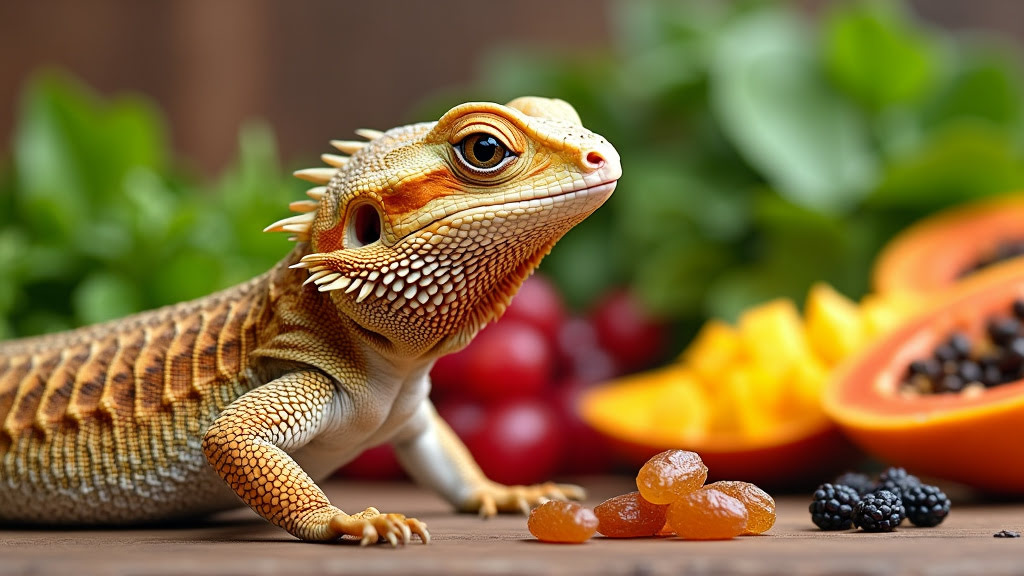Have you ever looked into your bearded dragon’s curious eyes and wondered if they can have a bite of your tasty raisins? As a proud owner of several bearded dragons, I’ve been there too! Understanding what our spiky pets need to eat is crucial for their health and happiness. Let’s go on a fun and informative adventure to find out if raisins are safe for our scaly friends!
Understanding What Bearded Dragons Eat
First things first, a bearded dragon’s diet is a colorful mix of different foods. These reptiles enjoy eating insects, vegetables, and sometimes, fruits. They need a balance of calcium, protein, and vitamins to stay healthy. Giving them a varied and balanced diet helps them live a long and happy life.
What They Need
Bearded dragons need:
- Calcium for strong bones and muscle function
- Protein for growth, especially in younger dragons
- Vitamins (like Vitamin D3) for overall health
They also like a bit of variety. Feeding them different foods makes sure they’re not just surviving, but thriving!
What’s in Raisins?
Now, let’s talk about raisins. These tiny dried grapes are packed with nutrients! Raisins have a lot of sugar, fiber, vitamins, and minerals. But they are different from fresh grapes.
Nutritional Content
Raisins contain:
- High levels of natural sugars
- Dietary fiber
- Essential minerals like potassium and iron
- Vitamins including B-complex vitamins
The main difference between raisins and fresh grapes is that raisins are dried and have a lot more sugar.
Can Bearded Dragons Eat Raisins?
So, can bearded dragons eat raisins? The answer is yes, but with a big caution! Based on my experience and what other reptile lovers say, raisins can be given as a treat, but not too often.
Possible Benefits
When given in moderation, raisins can offer:
- A quick source of energy due to their high sugar content
- Some essential vitamins and minerals
Possible Risks
But raisins can also have some risks:
- High sugar content: Too much sugar can cause obesity and other health problems.
- Lack of water: Being dried, they don’t offer the hydration that bearded dragons need.
The Rule of Moderation
The key rule when giving your bearded dragon raisins is moderation. It’s like humans and chocolate; a little bit is okay, but too much isn’t good.
How Often and How Much?
If you’re thinking about giving your bearded dragon raisins, follow these tips:
- Offer 1-2 raisins once a week (or even less often)
- Make sure it’s only a small part of a varied diet
Signs of Too Many Raisins
Watch out for signs that your dragon might have had too many sweets:
- Feeling tired or lazy
- Changes in poop
- Unexpected weight gain
Other Fruits to Try
While raisins can be an occasional treat, there are many other fruits that are healthier and safer for bearded dragons to eat regularly.
Healthy Fruit Options
- Berries (Strawberries, Blueberries): Packed with antioxidants and generally lower in sugars.
- Papaya: Rich in vitamins and helps with digestion.
- Mango: Provides vitamin A and is a juicy treat.
- Apples: In small, peeled pieces, they offer a crisp, hydrating snack.
How to Prepare Fruits
When giving these fruits to your bearded dragon, make sure they are:
- Fresh and thoroughly washed
- Cut into small, manageable pieces
- Free from any seeds or pits
General Tips for Bearded Dragon Treats
While treats are fun, the main part of a bearded dragon’s diet should be greens, veggies, and insects.
The Base Diet
- Greens (Collard greens, mustard greens)
- Vegetables (Bell peppers, squash)
- Insects (Crickets, dubia roaches)
Bringing in New Foods
When adding new foods to their diet, it’s important to do it slowly:
- Introduce new foods gradually
- Watch for any allergic reactions or digestive issues
- Talk to a vet if you’re not sure
Keeping Your Dragon Healthy
It’s important to watch your dragon’s health closely to catch any diet problems early.
Signs of Diet Problems
- Lethargy or decreased activity levels
- Changes in stool color or consistency
- Unexplained weight changes
The Importance of Vet Visits
Regular vet visits are important to keep your bearded dragon healthy. Your vet can give great advice and catch problems early.
When to See the Vet
If you see any worrying signs, or if your bearded dragon seems sick, don’t wait to go to the vet. It’s always better to be safe!
My Experience and Tips
Oh, the stories I could tell from caring for bearded dragons! Here are some things I’ve learned:
Successes and Lessons
One time, I gave my bearded dragon a tiny piece of papaya, and they were thrilled! It was like I had given them a special treat. But I also learned the hard way that too much of a good thing can cause tummy troubles (and extra cleaning for me!).
Conclusion
In short, raisins can be a treat for your bearded dragon, but only rarely. Remember, moderation is key. Most of their diet should be greens, veggies, and insects. Always watch their health and talk to a vet if you’re unsure.
Keep exploring, keep learning, and most importantly, keep loving your amazing bearded dragons!
Extra Resources
To learn more and provide the best care for your bearded dragon, check out some recommended books or exotic pet care guides.
Comments and Community
We’d love to hear your experiences, tips, and questions! Join our community and share your stories. Let’s learn and grow together as bearded dragon parents.

